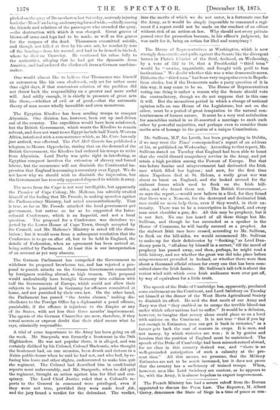A trial of some importance to the Army has been
going on all the week. Mr. Stacpoole was formerly a lieutenant in the 78th Highlanders. He was not popular there, it is alleged, and was certainly disliked by his Colonel, Colonel Mackenzie, who thought the lieutenant had, on one occasion, been drunk and riotous in a Nairn public-house when he said he had not, and who had, by re- fusing him leave and other slights, endeavoured to make him quit the regiment. The Colonel had described him in confidential reports most unfavourably, and Mr. Stacpoole, when he did quit the regiment, brought an action against him for libel and con- spiracy. The Lord Chief Justice ruled that a Colonel's re- ports to the General in command were privileged, even if they were not true, provided they were made bond fide, and the jury found a verdict for the defendant. The verdict, into the merits of which we do not enter, is a fortunate one for the Army, as it would be simply impossible to command a regi- ment if a report could not be made on the conduct of an officer , without risk of an action-at.law. Why should not every private passed over for promotion because, in his officer's judgment, he was unfit for it, bring an action for libel and conspiracy ?






































 Previous page
Previous page